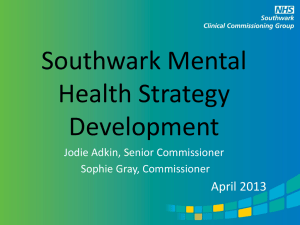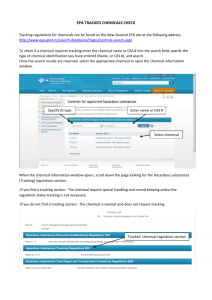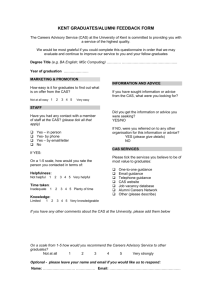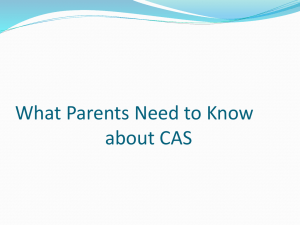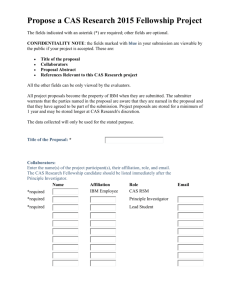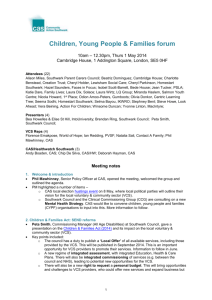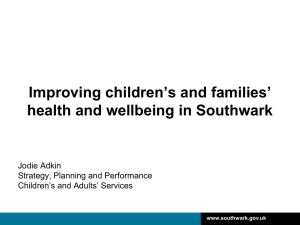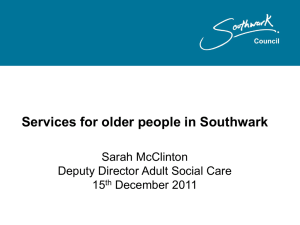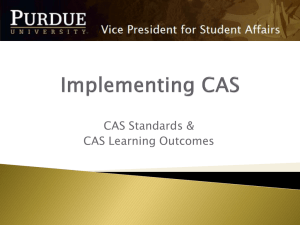Minutes - Community Action Southwark
advertisement
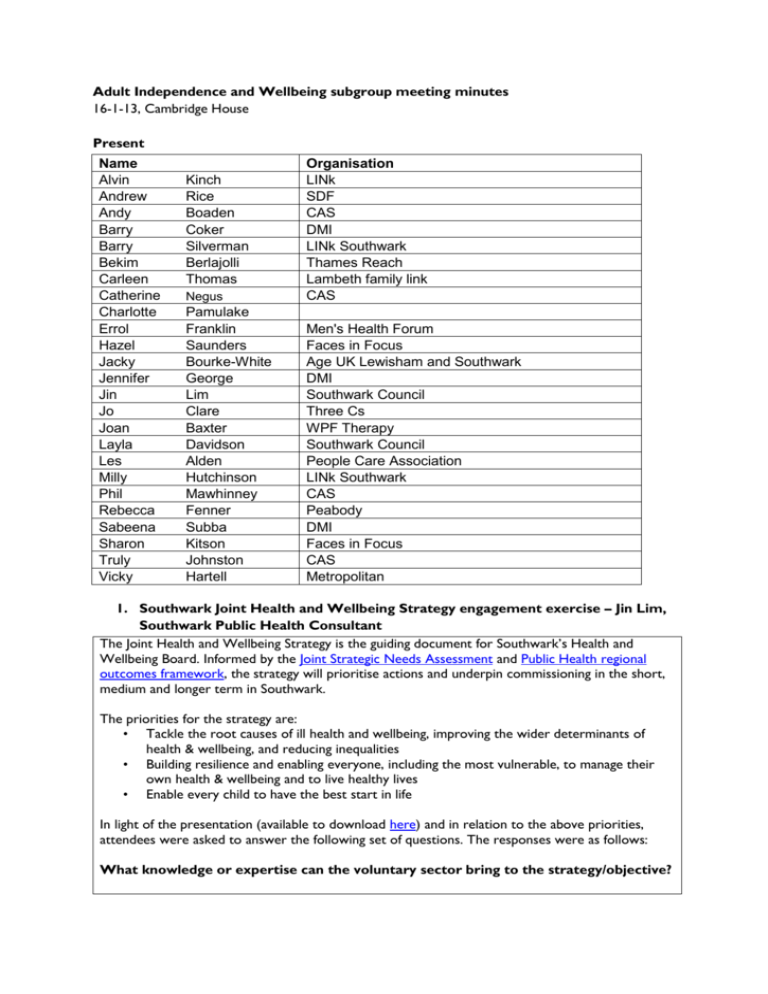
Adult Independence and Wellbeing subgroup meeting minutes 16-1-13, Cambridge House Present Name Alvin Andrew Andy Barry Barry Bekim Carleen Catherine Charlotte Errol Hazel Jacky Jennifer Jin Jo Joan Layla Les Milly Phil Rebecca Sabeena Sharon Truly Vicky Negus Organisation LINk SDF CAS DMI LINk Southwark Thames Reach Lambeth family link CAS Pamulake Franklin Saunders Bourke-White George Lim Clare Baxter Davidson Alden Hutchinson Mawhinney Fenner Subba Kitson Johnston Hartell Men's Health Forum Faces in Focus Age UK Lewisham and Southwark DMI Southwark Council Three Cs WPF Therapy Southwark Council People Care Association LINk Southwark CAS Peabody DMI Faces in Focus CAS Metropolitan Kinch Rice Boaden Coker Silverman Berlajolli Thomas 1. Southwark Joint Health and Wellbeing Strategy engagement exercise – Jin Lim, Southwark Public Health Consultant The Joint Health and Wellbeing Strategy is the guiding document for Southwark’s Health and Wellbeing Board. Informed by the Joint Strategic Needs Assessment and Public Health regional outcomes framework, the strategy will prioritise actions and underpin commissioning in the short, medium and longer term in Southwark. The priorities for the strategy are: • Tackle the root causes of ill health and wellbeing, improving the wider determinants of health & wellbeing, and reducing inequalities • Building resilience and enabling everyone, including the most vulnerable, to manage their own health & wellbeing and to live healthy lives • Enable every child to have the best start in life In light of the presentation (available to download here) and in relation to the above priorities, attendees were asked to answer the following set of questions. The responses were as follows: What knowledge or expertise can the voluntary sector bring to the strategy/objective? The strength of the voluntary and community sector (VCS) lies in its ability to provide a holistic service that addresses the wider determinants of health such as employment, housing etc. e.g. the Thamesreach Employment Academy who support the homeless & people with mental health issues back into work. The VCS provides personalised services. They can explain conditions/how to access services in plain language. Service users/patients need to be seen as people rather than a condition/number. What should be the measures of success/desired outcomes? Greater focus on outcomes rather than outputs and processes. The outcomes should be jointly decided by public and voluntary and community sector colleagues. There are a great variety of strategies that need to be rationalised as part of the JHWBS. Better joining up of services/prioritisation of mental health. A particular problem area is the lag in supporting people out of mental health centres and into council housing. The resultant cost in future services is huge because of this disconnect. Connectedness/Loneliness has such a huge effect on health. Needs to be prioritised. Greater focus on recovery, not just maintenance in relation to Mental Health. GPs referring to VCS either through database of VCS providers built into their systems or a designated person working within GP practices. What actions are needed? To make engagement around strategic priorities meaningful, the general public need to be involved in resource allocation and be able to influence this. Performance/quality of GP services is hugely variable across the borough. Lack of knowledge amongst local population about what constitutes a good service. This is reflected in people’s inability to self-manage conditions e.g. Diabetes. PALS service not visible enough/understood. Performance data should therefore include stakeholder perception of GP surgeries. By creating a benchmark, this could be used to drive quality up. VCS to raise awareness/expectations among patients of the kind of service they need/deserve. Support needs to reach people earlier. People with long term mental health problems tend to have established these by 14 years old. Revive Total Place initiative with greater VCS involvement Greater VCS engagement with the Integrated Care Programme. Know what they are retendering and when they require input. Look at current performance. 2. Improving how CAS represents and lobbies for the voluntary sector – Andy Boaden and Phil Mawhinney, CAS CAS is constantly looking to give the local voluntary sector a stronger voice amongst policy makers. A number of exciting developments over the past few months have begun to provide CAS with a stronger evidence base and levers to influence to help the sector achieve this. The Thinking allowed…about Health Summit. The summit was part of a series of events between senior public and voluntary sector figures to create an action plan to improve partnership working in relation to particular areas of work. The Health Summit tackled Clinical Commissioning, the Health and Wellbeing Board, the transition of Public Health into the Local Authority and the formation of Healthwatch. The action plan from the Health summit (outlined in the presentation which is available to download here) focused on issues such as market development, communication, strategic planning, collaboration and co-production. Attendees were invited to give feedback on the action plan. Key points included: The need for commissioning timetables Creation of subcontracting opportunities for niche providers in the developing Health agenda Organisational charts of Council and Clinical Commissioning Group An update list of providers for GPs to refer patients on to. Clarification over the role of Healthwatch in the new health landscape More information and engagement with the Integrated Care Programme A new system of elected representatives has been developed to represent the wider voluntary sector more effectively at Southwark’s strategic partnership boards. During November 2012, CAS invited applications to become representatives with the 30 successful applicants being announced at CAS’s AGM on 5th of December 2012. From January to April 2013, CAS will be working with the Reps to train them in their role, agree key messages and develop communications with the wider sector. The new system of Reps is set to go live in April 2013 at which point more information will be circulated. More information can be found in the presentation which is available to download here. The culmination of the new system of Reps and the summits, alongside a review of CAS’s existing policy work, will be a CAS Policy Strategy that outlines priorities for 2013. This will be published in March and circulated amongst the members via the Cascade e-bulletin for comment. Read more about how CAS are improving their policy work here

